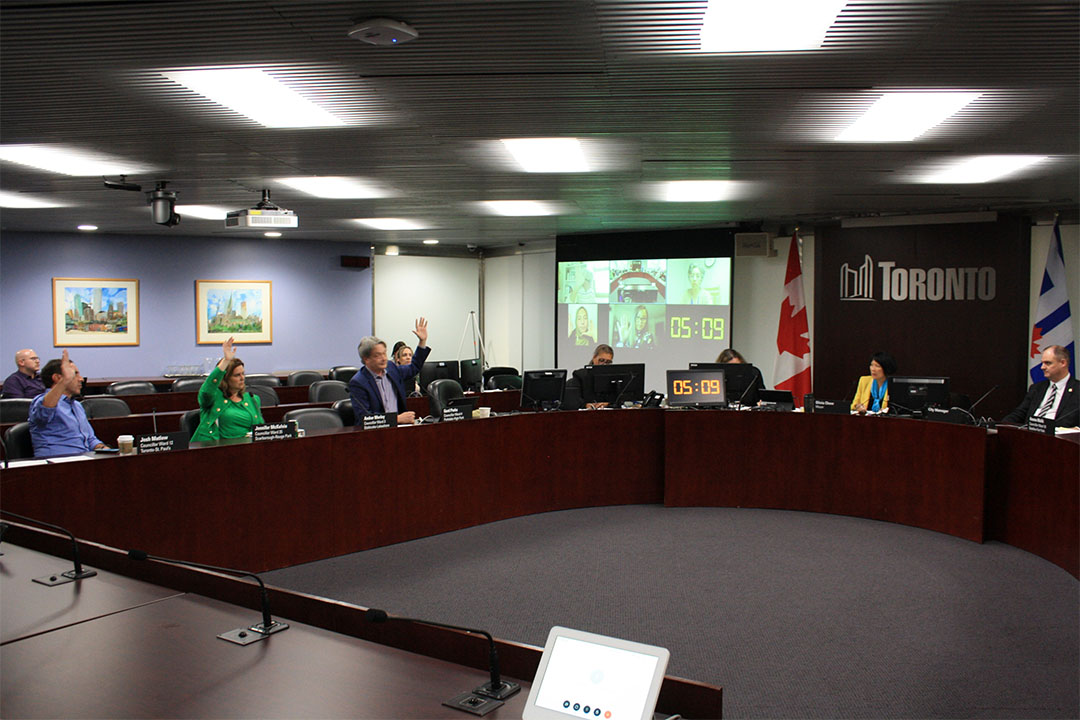On August 24, the City of Toronto’s Executive Committee received the City’s updated long-term financial plan (LTFP). The updated LTFP, a report prepared by City officials, outlines the estimated $46.5 billion fiscal gap between the City’s revenue and spending over the next decade — the result of increasing operating costs, debt, and infrastructure costs.
The committee recommended the City Council pursue measures proposed in the report such as implementing a city-level sales tax in 2024; pausing negotiations with the province on certain transit projects; and allowing the Toronto parking authority to increase parking fees. Many students — including one from U of T — spoke at the meeting, with some expressing their support for prioritizing public transit in budget decisions.
Financial woes
Paul Johnson, Toronto’s city manager, and Steve Conforti, the City’s interim chief financial officer, gave a presentation on the LTFP. The city government is struggling to fund both the infrastructure required to manage the city’s growth and the services demanded by its citizens.
The LTFP states that the City could raise more money by tweaking the programs it currently runs. The cost of street parking in the city currently ranges from $1 to $5 an hour. According to Conforti, these rates are “lower than comparable cities in North America”; Vancouver has rates up to $11 an hour, and New York City charges up to 7.50 USD. The LTFP recommends that the City Council remove the current $5 per hour cap and allow the parking authority to decide parking rates — a proposal that the Executive Committee endorsed.
Although the City can independently implement many of the changes proposed by the report, Conforti told the committee that “the city alone can only address about 40 per cent of this [funding] pressure.” To cover the remaining 60 per cent of its $46.5 billion funding gap, the report proposed that the city pursue measures such as adding a Municipal Sales Tax (MST) to the purchase of goods and services. Conforti noted that Quebec applies an MST to all purchases, while New York City applies a tax to purchases over 110 USD. However, implementing an MST would require provincial approval.
City officials who prepared the report advised the City Council to tell the Ontario government that, without new funding appropriate for “the largest public transit system in Canada,” the City will pause negotiations on transit projects prioritized by the province. “There is no easy or pain-free option that we could bring forward,” said Johnson in his closing remarks. “If it was easy, we would have found it already.”
In two weeks, the committee’s recommendations will head to the City Council, which will vote on whether or not to approve the proposals.
Voices of concern
During the meeting, a significant number of students told stories and voiced their thoughts on the LTFP.
Sofia Alexandrian, a Scarborough resident and a first-year engineering student at U of T, spoke in favour of a proposal to generate funds for the TTC using a new parking levy, which would involve a tax paid by owners of commercial property. In particular, Alexandrian asked for more frequent bus service in Scarborough and a more pleasant riding experience, which would encourage more people to use the TTC. “It’s worth it to reverse transit cuts,” she told the committee members. This past summer, the TTC has announced service reductions following what critics have called a history of insufficient funding.
In an interview with The Varsity after the meeting, Aidan Thompson, the University of Toronto Students’ Union’s (UTSU) vice-president, public and university affairs, also advocated for the City to make other cuts instead of reducing transit funding, highlighting that transit changes in particular tend to affect students. Thompson also expressed support for increasing the cost of parking, which he noted has the added benefit of reducing automobile usage.
Although the UTSU was not present at the meeting in an official capacity, Thompson attended because he wanted to learn about and advocate for the importance of student issues in municipal affairs. “I think that any changes that the city makes, regardless of the sector, will always disproportionately impact students,” said Thompson. The Varsity spoke to Mayor Olivia Chow about students’ high engagement with the LTFP. “It gave me a lot of hope that young people, whether [from] high school, or university, or engineering studies, talk about how a city should function properly. And having that perspective is so important because often you only hear people saying… nothing ever changes,” she said. “Whereas today, I’m hearing concrete solutions.”



No comments to display.